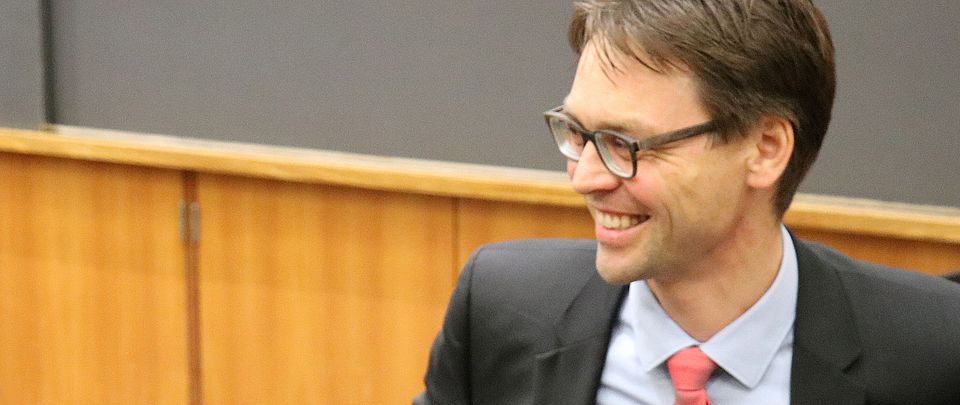
MajorEconomics
This major focuses on core topics in Economics, which will be taught at an advanced and rigorous formal level. You will acquire comprehensive knowledge of Microeconomics, Macroeconomics and Econometrics with the necessary mathematical foundations. You may choose to specialize further in one of these three areas or to study all of them in depth. The program is supplemented by courses in applied areas of Public Economics, Political Economy, Monetary Economics, Finance, Health Economics, Environmental Economics, Labor Economics, and Computational Economics.
A Major in Econmics includes the following elements:
Fundamentals in Business and Economics (12 ECTS).
This module consists of the three lectures "62650 - Behavioral Science", "12036 - Econometrics" and "62651 - Theory of the Firm", which are mandatory for all students of the Master's program in Business and Economics. If you are pursuing a Major in Economics, we strongly advise to take the course "Econometrics" as early as possible, ideally in your first semester.
Core Courses in Economics (18 ECTS)
This module provides the core tools required for a rigorous, quantitative approach to solving economic problems. It consists of four lectures in Econometrics, Microeconomics, Macroeconomics, and Mathematics, all of which are mandatory.
The course in Mathematics if offered in the two weeks before the offical lectures start fall semester, so that you can acquire the necessary mathematical background for the other three Core Courses. You are advised to take all Core Courses as early as possible. Assuming a start in fall semester, the recommended plan of study is as follows:
- 18545 - Advanced Mathematics for Economics | 1st semester - block course before lectures officially start!
- 65937 - Advanced Microeonomics | 1st semester
- 41957 - Advanced Econometrics | 1st semester
- 65943 - Advanced Macroeonomics | 2nd semester
Research Design (6 ECTS)
Writing and presenting a paper in the seminar "65944 - Economics" is mandatory for this major. Doing so familiarizes you with the current research frontier in one of the main fields in economics (students may choose whether they want to write their seminar paper in microeconomics, macroeconomics, or fields) and helps you to prepare for your master's thesis.
- 65944 - Economics | recommended as of 2nd semester or later (if study start is in fall)
Specific Electives (12 ECTS)
This module allows you to acquire deeper exposure to specific economics fields or methods. You choose the ECTS from the designated list of the medium-term curriculum (Master in Business and Economics > Major in Economics). Recommended as of 2nd semester or later (if study start is in fall).
General Electives (0 or 24 ECTS)
This module allows you to take further courses in economics or pursue interests in related fields. They can choose according to their preferences among the courses offered for the Master of Science in Business and Economics or mentioned in the "General Electives" module in the medium-term curriculum (Master in Business and Economics > Major in Economics > General Electives). You have to obtain 12 ECTS (if you write a 30 ETCS master's thesis) or 24 ECTS (if you write a 18 ECTS master's thesis) in this module. If you earn more than the minimum number of ECTS in other modules of the program, the minimum number of ECTS is reduced accordingly, in extreme cases to 0 ECTS.
Master's Thesis (18 or 30 ECTS)
The master’s thesis is the capstone of the Major in Economics, providing you with the opportunity to apply the skills they have acquired in the program to a specific economic problem. As a rule, you have 15 weeks to complete the master's thesis and will acquire 18 ECTS for the thesis. Alternatively, you can opt for spending 25 weeks writing a more ambitious master's thesis worth 30 CP. We recommend that students in the Major in Economics pursue this option. More information about the master's thesis is available here.
| Module | Credits |
|---|---|
| Fundamentals in Business and Economics | 12 |
| Core Courses in Economics | 18 |
Research Design in Economics | 6 |
| Specific Electives in Economics | 12 |
| General Electives | 0 to 24 |
| Master's Thesis in Economics | 18 or 30 |
| Total | 90 |
Which lectures are part of the program? Have a look!
Need a timetable to plan your semester?
All you need to know about the master's thesis.
Wirtschaftswissenschaftliche Fakultät
News
Events
Ort: Zoom
Veranstalter:
CAS Sustainable Real Estate
Digital Info Session | CAS Sustainable Real Estate
Do you have a passion for advancing sustainability where it truly counts? Unlock your potential to transform real estate investment for a sustainable future with our “CAS Sustainable Real Estate” at the University of Basel.Ort: WWZ Auditorium
Basel Capital Market Days 2026 | 5. Ausgabe
Anlegen in Zeiten geopolitischer UnsicherheitOrt: WWZ Auditorium
Veranstalter:
ProFamilia
Wer gewinnt, wer verliert?
Sparen, Schulden und Finanzen | Die Veranstaltung ist ein Engagement von Pro Familia Basel Regio im Rahmen der jährlichen «Swiss Money Week», die auf Finanzthemen sensibilisiert.Ort: Zoom
Veranstalter:
MBA Marketing and Business Development
Digitaler Infoabend des MBA Marketing and Business Development
Schenk dir selbst Zukunft – mit dem MBA der Universität BaselOrt: Zoom
Veranstalter:
MBA Finance | Executive Master in Finance (MiF)
Digital Info Session | MBA Finance | Executive Master in Finance (MiF)
🚨 Financial professionals, take notice 👇🏼WWZnewsletter
People
Research Centers
Die Wirtschaftswissenschaftliche Fakultät
Gegründet 1460 ist die Universität Basel die älteste Hochschule der Schweiz. Die Wirtschaftswissenschaftliche Fakultät ist die zweitjüngste der insgesamt sieben Fakultäten der Universität Basel und wurde 1995 etabliert. Das Fach Ökonomie konnte zu diesem Zeitpunkt jedoch schon auf eine fast 150-jährige Tradition in Basel zurückblicken.
WWZ Forum
Das WWZ Forum koordiniert und betreut die durch den Förderverein unterstützten Forschungsprojekte, pflegt den Kontakt mit bestehenden und zukünftigen Sponsoren und ist für den Wissenstransfer der in der Forschung erarbeiteten Inhalte verantwortlich.
Quick Links
Social Media

Prof. Dr. Kurt Schmidheiny
Economics and Applied Econometrics
Kurt Schmidheiny is Professor of Economics and Applied Econometrics at the University of Basel. He is also a Research Fellow at the Centre for Economic Policy Research (CEPR, London) and at CESifo (Munich), and a member of the editorial boards of the Journal of Urban Economics and the Journal of Economic Geography. He published in the Journal of Political Economy, American Economic Journal, Economic Journal, Journal of Public Economics, Journal of Urban Economics, Regional Science and Urban Economics, and Journal of Economic Geography.
His research focuses on tax competition, fiscal federalism, and urban economics. Kurt Schmidheiny often works with detailed administrative data such as individual-level tax data on individuals and firms. He also develops the necessary applied microeconometrics methods used to estimate causal effects from such data.
Module Responsible:

Prof. Dr. Sarah M. Lein
Sarah M. Lein is associate professor of macroeconomics. Before joining the University of Basel in November 2014, she worked as a Senior Economist in the Economic Analysis Unit at the Swiss National Bank. She received her doctoral degree from the University of Zurich in 2009. She is a co-editor of the Swiss Journal of Economics and Statistics, a research fellow at the CEPR, a research fellow at the KOF ETH Zurich, and executive officer of the Central Bank Research Association (CEBRA). Her research focusses on monetary economics, international macroeconomics and finance, and business cycles.
Other lecturers
Students with a university degree that is quantitatively and qualitatively equivalent to the Bachelor of Arts in Business and Economics of the University of Basel are admitted to the master's program without additional requirements. Other university degrees are assessed for equivalence and are admitted with additional requirements if necessary.
Prospective students with a Bachelor of Arts in Business and Economics from the University of Applied Sciences Northwestern Switzerland (FHNW) can find detailed information on admission and the optimal course of study in this information sheet.
The detailed admission requirements are regulated in the study plan. If you have any questions about possible requirements, you can contact the Dean of Studies' Office of the Faculty of Business and Economics. However, without an existing official application, only a legally non-binding information can be given.
Please send your application to the Student Administraiton Office. From there you will also receive the legally binding admission decision.
Kontakt

Dean of Studies' Office
University of Basel, Faculty of Business and Economics
Peter Merian-Weg 6
CH-4002 Basel
phone: +41 61 207 33 01
Website Dean of Studies' Office
Quick Links
Social Media


















































